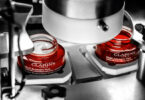Luxury watchmaker Hublot partnered with tech company KerQuest to implement an electronic passport and warranty system for all its watches. The new technology aims to fight counterfeits and make the process of initiating a warranty simpler. The e-warranty is registered on the AURA luxury blockchain network. The solution is compatible with all Hublot’s pieces produced since the start of 2020.
KerQuest has developed a solution that enables the recognition of objects through smartphone photos, much like passport facial recognition. Due to each Hublot watch’s unique material make-up and leveraging artificial intelligence, the technology is used to recognize each watch and certify its authenticity.
Every piece is quite literally photographed as it comes out of production. Then, when the watch is sold, the point of sale uses Hublot’s e-warranty application to take a picture of the face of the watch. The photo is sent to a server that processes it and activates the warranty if the piece is authentic.
If someone wants to buy a watch, Hublot’s e-warranty app enables the verification of a piece’s authenticity and the retrieval of its warranty status.
As mentioned, Hublot’s e-warranty will be registered on the AURA blockchain. The project was initiated by luxury conglomerate LVMH to fight the counterfeiting of luxury brands and has been live for more than a year. Hublot is part of the LVMH group.
In 2016, the OECD estimated that counterfeit goods were worth 2.5% of global imports, and closer to 5% in Europe. Furthermore, in 2018 luxury brands lost $30.3 billion worth of sales to counterfeits online alone. AURA’s blockchain network enables consumers to trace the history and authenticity of luxury goods. Its model enables participating brands such as Hublot to choose to emphasize tracing authenticity or customer loyalty through its features.
ConsenSys developed AURA and Microsoft is the hosting partner.
With such a large market in need of anti-counterfeiting solutions, other initiatives have emerged. Arianne is a notable blockchain project for end-to-end traceability and proof of authenticity of products. It runs a luxury consortium that includes one of Hublot’s competitors, Breitling, as part of its network.
Meanwhile, Everledger launched DNA tagging to prevent counterfeiting of leather luxury products in 2018. And last year, Mastercard helped to develop a blockchain-based traceability solution for high-end clothing. More recently, PwC and blockchain firm Luxochain launched a platform for verifying the authenticity of luxury products called Virgo.






